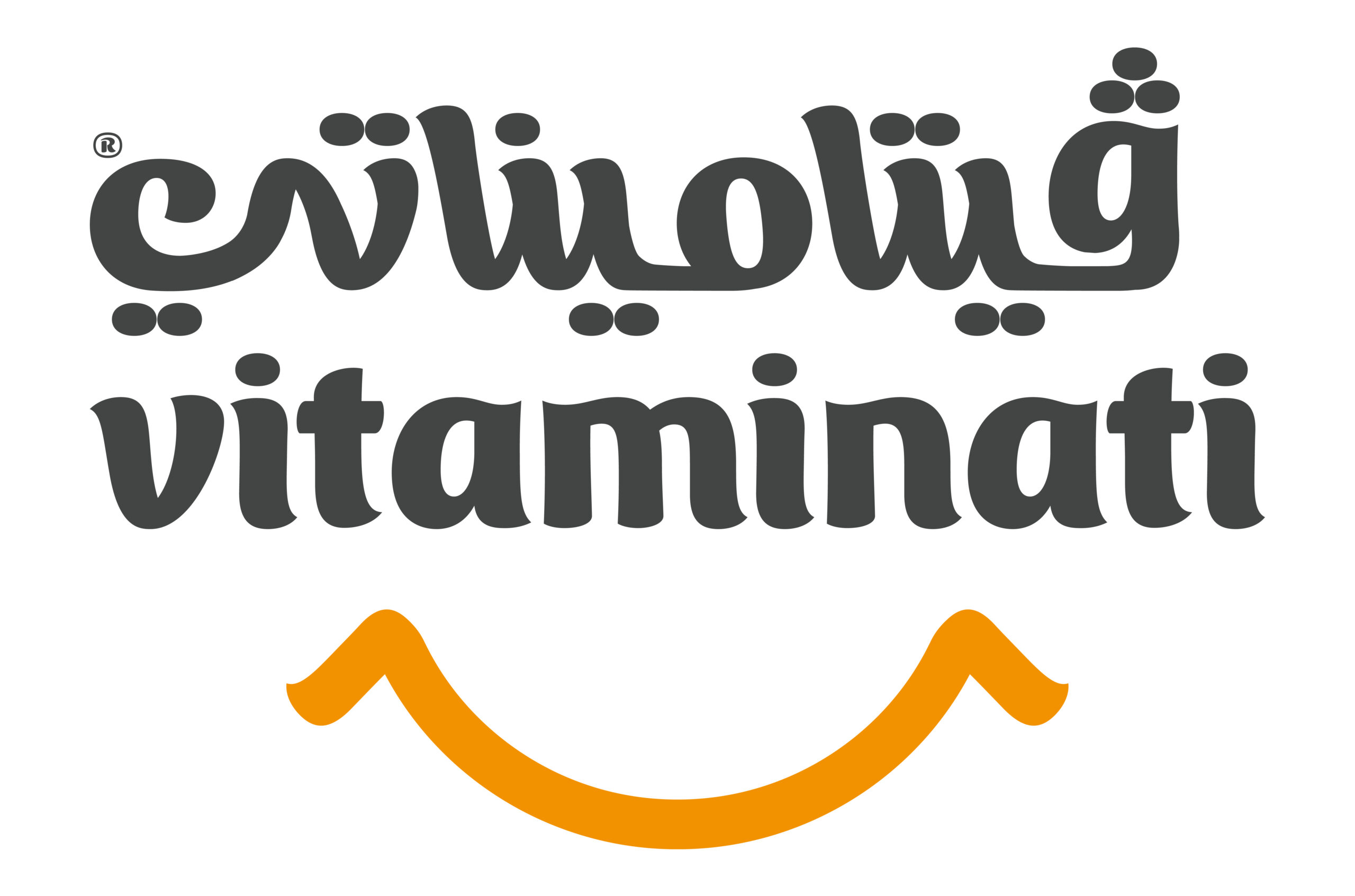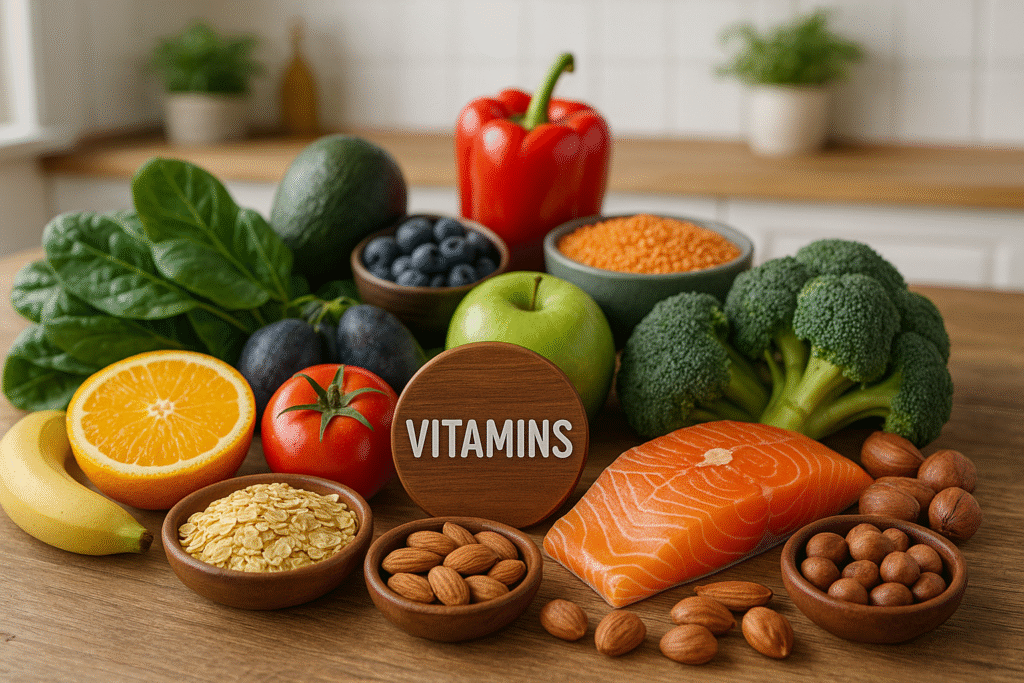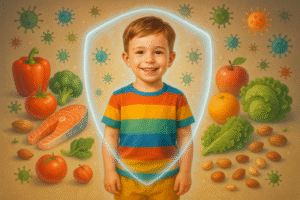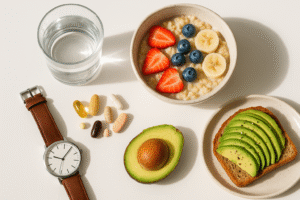Many people wonder: Can the body get all vitamins from food only?
Theoretically, a balanced diet can provide most of the body’s needs for vitamins and minerals, especially when it’s rich in fruits, vegetables, whole grains, proteins, and nuts.
However, in reality, the answer depends on several factors — lifestyle, health status, type of diet (especially vegetarian diets), and the body’s ability to absorb nutrients.
According to the World Health Organization (WHO), “a healthy and varied diet is the primary source of the vitamins and minerals essential for body functions.”
However, it also notes that certain exceptional cases may require dietary supplements to support individual needs.
Table of Contents
ToggleWhat Is the Difference Between Vitamins and Minerals?
Both vitamins and minerals are essential micronutrients the body needs to function properly.
Vitamins are organic compounds required for metabolism, while minerals are inorganic elements vital for bone health, nerve function, and enzyme activity.
The Role of Food in Providing the Body with Vitamins:
Food is the most natural and effective source of vitamins. It not only supplies nutrients but also provides plant compounds and antioxidants that enhance absorption and improve bioavailability.
By eating balanced, colorful meals, the body receives a wide range of vitamins from natural food, which supports immunity and maintains the health of the skin, brain, and bones.
The Office of Dietary Supplements (ODS) in the U.S. states that vitamins from food are absorbed more effectively than those from supplements because food contains helpful components such as healthy fats, fiber, and enzymes.
How Are Vitamins Absorbed in the Body?
Vitamins are absorbed in two main ways:
-
Water-soluble vitamins (like C and B-complex) dissolve in water and are excreted through urine, requiring daily intake.
-
Fat-soluble vitamins (A, D, E, K) dissolve in fat and are stored in body tissues for longer periods.
Vitamins That Are Easily Obtained from Food:
Most healthy individuals can meet their daily vitamin requirements through a varied diet. Examples include:
- Vitamin C: Found abundantly in citrus fruits, peppers, strawberries, and broccoli.
- Vitamin A: Found in carrots, sweet potatoes, liver, and egg yolks.
- Vitamin K: Present in leafy green vegetables such as spinach and broccoli.
- B Vitamins (except B12): Found in whole grains, legumes, and nuts.
These foods are among the most important natural sources of vitamins recommended by nutrition experts worldwide.
Vitamins That Are Hard to Obtain Entirely from Food:
Despite the variety of food sources, some vitamins are difficult to get in sufficient amounts from food alone. The most notable are:
- Vitamin D: Hard to get from food; sunlight exposure is the main source. Found in small amounts in fatty fish, egg yolks, and fortified milk.
- Vitamin B12: Found only in animal products such as meat, eggs, and dairy, making deficiency common among vegetarians.
- Vitamin E: Found in nuts and seeds but requires healthy fats for proper absorption.
In such cases, the World Health Organization (WHO) recommends testing vitamin levels regularly and using supplements if necessary.
Natural Sources of Vitamins:
Getting vitamins from natural food is the best choice for long-term health.
Some of the most important natural sources of essential vitamins include:
-
Leafy green vegetables: Rich in vitamins A, C, K, and folic acid.
-
Fruits: High in vitamins C and A and contain powerful antioxidants.
-
Nuts and seeds: Provide vitamin E and healthy fats.
-
Red meat and poultry: Excellent sources of B-complex vitamins.
-
Fish: One of the top natural sources of vitamins, especially D and B12.
Nutritionists emphasize the importance of dietary diversity to meet the body’s needs fully and effectively.
When Food Alone Is Not Enough
While getting vitamins from food is ideal, certain situations make it difficult for the body to meet all its nutritional needs through diet alone, such as:
-
Pregnancy and breastfeeding: Require additional folic acid and iron.
-
Older adults: Reduced absorption of vitamin B12 and D with age.
-
Vegetarians: Lack natural sources of vitamin B12.
-
Digestive disorders: Such as celiac disease or inflammatory bowel conditions, which impair nutrient absorption.
In such cases, Can the Body Get All Vitamins from Food?
No, dietary supplements may be necessary to compensate for deficiencies. Read about signs of vitamin deficiency.
The Role of Supplements: Support, Not a Substitute.
The WHO and the Office of Dietary Supplements (ODS) affirm that supplements are not substitutes for real food — they are supportive aids when needed.
Relying solely on supplements can lead to imbalances or overdoses of certain nutrients.
Supplements are beneficial only when:
-
A deficiency is confirmed through blood tests.
-
There are special needs such as pregnancy or advanced age.
Natural food remains the safest and most effective source of daily vitamin requirements.
The Difference Between Food and Supplements:
Food provides a complete mix of nutrients, including fiber and antioxidants that supplements cannot replicate.
Supplements, on the other hand, contain isolated compounds lacking the natural synergy of food-based nutrients.
In short:
Food nourishes, while supplements assist.
The balance between the two is the key to sustainable health.
The Best Vitamin-Rich Foods:
If you’re looking for the best foods rich in vitamins, so your Body can Get All Vitamins from Food nutritionists recommend:
-
Spinach and broccoli (vitamins K and C).
-
Carrots and sweet potatoes (vitamin A).
-
Fatty fish and sardines (vitamins D and B12).
-
Citrus fruits (vitamin C).
-
Almonds and walnuts (vitamin E).
-
Whole grains and legumes (B vitamins).
Conclusion: Balance Is the Key.
Ultimately, it’s undeniable that getting vitamins from food is the safest and most effective choice.
But Can the Body Get All Vitamins from Food?
The answer is: “Yes, in most cases — but not always.”
Certain medical or dietary conditions may require supplemental support under professional guidance.
Maintaining dietary diversity is the foundation for achieving balance between natural food and supplements.
Trusted Sources:
-
Office of Dietary Supplements (ODS) – U.S. National Institutes of Health.
-
Harvard School of Public Health – Vitamins and Minerals Guide.
Frequently Asked Questions (FAQs):
- Can you get all vitamins from food only?
Yes, through a varied diet — though supplements may be needed for vitamin D and B12. - What are the best natural sources of vitamins?
Fruits, vegetables, nuts, fish, and whole grains. - Do vegetarians need supplements?
Yes, especially for vitamin B12, which is scarce in plant-based foods. - Are supplements always safe?
They’re safe when taken at appropriate doses under medical supervision. - What’s the difference between food and supplements?
Food provides a complete nutrient mix, while supplements fill specific gaps. - Why is dietary diversity important?
Because it ensures the body receives all essential vitamins and minerals in balanced amounts. - What is the Role of vitamins in immunity? Read the blog.
PharmD with expertise in pharmaceuticals and a passion for making medical knowledge clear, accurate and accessible to all








